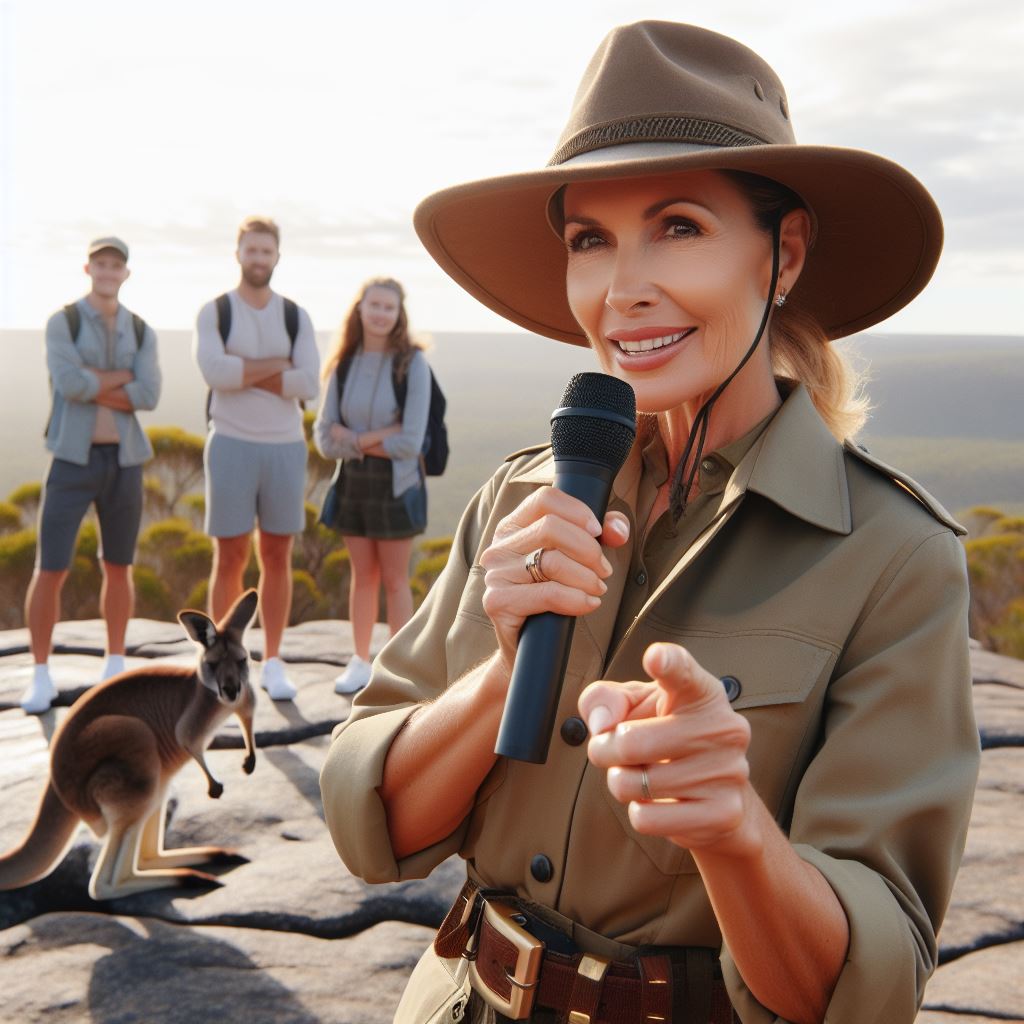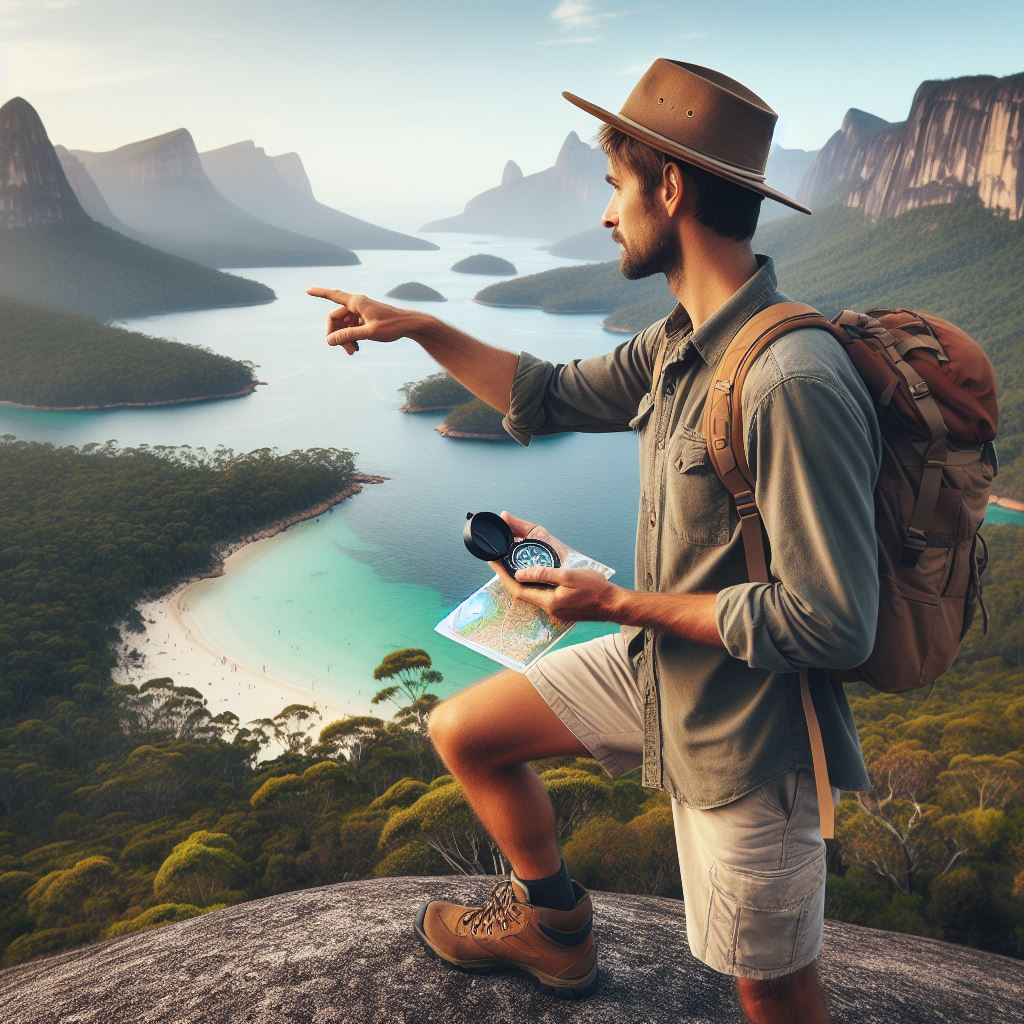Introduction
Tour guides play a crucial role in the tourism industry, providing valuable information and enhancing visitors’ experiences.
Becoming a tour guide involves a range of responsibilities and skills.
This section provides an introduction to the topic and highlights the importance of tour guides in the industry.
Tour guides are an essential part of the tourism industry, as they act as ambassadors for the destinations they guide visitors through.
They have the knowledge and expertise to make the trip educational, informative, and enjoyable.
Becoming a tour guide requires a diverse skill set, including proficiency in multiple languages, excellent communication and interpersonal skills, and a deep understanding of the history, culture, and attractions of the destination.
They must be able to gauge the needs and interests of the group they are guiding and adapt their commentary accordingly.
In addition to providing facts and information about the destination, tour guides also ensure the safety and well-being of the group.
They must be able to handle unexpected situations, such as medical emergencies or travel disruptions, while maintaining a calm and professional demeanor.
Moreover, tour guides need to be passionate about their work, as they are responsible for creating memorable experiences for visitors.
They have the opportunity to showcase the unique aspects of a destination and ignite a love for travel and exploration in their clients.
In essence, tour guides are an indispensable part of the tourism industry.
They bring destinations to life and make travel experiences more enriching.
Becoming a tour guide requires a range of skills and a passion for sharing knowledge and creating memorable experiences for visitors.
Research and Education
Obtaining a relevant degree or certification is crucial for becoming a successful tour guide.
While it may not be a mandatory requirement in all cases, having formal education in the field can immensely help in establishing credibility and increasing job prospects.
Tourism, history, geography, and hospitality are some of the recommended fields of study for aspiring tour guides.
These subjects provide a solid foundation and comprehensive understanding of the various aspects related to tourism and guiding.
Researching local regulations and requirements for tour guides is essential.
Each destination may have specific rules and guidelines, such as obtaining a license or permits, that need to be complied with.
It is crucial to be aware of and adhere to these regulations to operate legally and ethically.
Finding accredited training programs or courses is highly recommended.
These programs offer structured education and practical training specifically tailored for aspiring tour guides.
Opting for accredited courses ensures that the training received meets industry standards and enhances the chances of professional growth.
Gaining specialized knowledge in specific types of tours is advantageous.
By focusing on cultural, adventure, eco-tours, or any other niche, tour guides can cater to a specific target audience and develop expertise in delivering exceptional experiences.
Tips for Research and Education
- Start by researching universities, colleges, or institutes that offer relevant degree programs or certifications in tourism, history, geography, or hospitality.
- Look for programs that have a strong emphasis on practical training, field trips, and internships to gain hands-on experience.
- Consider enrolling in online courses or distance learning programs if attending a physical institution is not feasible. Many reputable institutions offer flexible options to suit individual needs.
- Check with local tourism boards or government agencies to understand the licensing requirements and regulations for tour guides in the desired destination.
- Seek recommendations from experienced tour guides or industry professionals on reputable training programs that have a good track record.
- Attend industry conferences, workshops, or seminars to expand your knowledge and network with fellow professionals.
- Stay updated with the latest trends, news, and developments in the tourism industry through books, research papers, online resources, and professional associations.
- Consider joining professional associations or organizations related to tour guiding. These provide valuable resources, networking opportunities, and access to industry events.
- Take advantage of technological advancements by learning about digital tools, mobile applications, and online platforms that can enhance the tour guiding experience.
- Continuously seek opportunities for self-improvement and skill enhancement. Stay curious and open to learning from experiences and feedback from clients.
Becoming a tour guide requires dedication, knowledge, and continuous learning. Obtaining a relevant degree or certification, researching local regulations, and gaining specialized knowledge are critical steps for success.
Investing in education and training not only enhances professional credibility but also enables tour guides to provide memorable and enriching experiences for their clients.
Read: Travel Agents: Trends in Australia for 2024
Developing Essential Skills
When it comes to becoming a tour guide, there are several essential skills that aspiring guides must develop. These skills will not only enhance the overall experience for guests, but also ensure that the tour runs smoothly and efficiently.
Effective communication and public speaking skills
One of the most important skills for a tour guide is effective communication. Guides must be able to convey information in a clear and engaging manner, ensuring that guests understand and appreciate the content.
Additionally, strong public speaking skills are essential to captivate and hold the attention of the group.
Language proficiency, especially in popular tourist languages
In today’s globalized world, speaking multiple languages is a definite advantage for tour guides. A proficiency in popular tourist languages such as English, Spanish, French, and Mandarin allows guides to cater to a wider range of guests.
This skill can enhance the overall experience and create a more inclusive tour environment.
Active listening and attentiveness to guests’ needs and questions
Being an active listener is crucial for tour guides. It involves attentively listening to guests’ questions, concerns, and needs, and providing appropriate responses.
By actively engaging with guests, tour guides can ensure a personalized experience, making visitors feel valued and heard.
Leadership and organizational skills
As a tour guide, leadership and organizational skills are necessary to lead groups effectively. Guides must be able to manage a diverse range of personalities and keep the group engaged throughout the tour.
They also need to have excellent organizational skills to coordinate the logistics and ensure a smooth experience for all participants.
Adaptability and problem-solving abilities
Being adaptable and having strong problem-solving abilities are essential traits for tour guides. Circumstances may change on a tour, such as unexpected weather conditions or last-minute changes in itinerary.
Guides need to be flexible and quick on their feet to handle these situations effectively, ensuring a seamless experience for guests.
In a nutshell, becoming a tour guide requires the development of various essential skills. Effective communication, language proficiency, active listening, leadership, adaptability, and problem-solving abilities are all crucial for a successful career in guiding.
By honing these skills, aspiring tour guides can create memorable experiences for their guests and excel in their profession.
Read: How to Become a Travel Agent in Australia
Building Experience
In order to become a successful tour guide, it is important to have a strong foundation of experience and skills.
Building experience is crucial in this field, and there are several steps you can take to gain the necessary knowledge and expertise.
One way to start building experience as a tour guide is by volunteering or interning with local tour companies.
This allows you to get firsthand experience in the industry, learn about different tour operations, and develop important skills such as communication and customer service.
Additionally, shadowing experienced tour guides can provide valuable hands-on training.
By observing how they interact with tourists, handle unexpected situations, and provide informative commentary, you can learn important techniques and gain confidence in leading tours.
Another important aspect of building experience is becoming familiar with popular tourist attractions and destinations in your area.
This involves doing thorough research, visiting these locations yourself, and learning about their historical and cultural significance.
By having in-depth knowledge about the places you will be guiding people to, you can provide a more engaging and informative experience for your clients.
Depending on the type of tours you plan on giving, obtaining a commercial driver’s license may be necessary.
This is especially true if you will be leading tours that involve transportation, such as bus or van tours.
Having a commercial driver’s license not only allows you to legally operate these vehicles, but it also shows potential employers that you are qualified to handle the logistics of the job.
Networking with professionals in the tourism industry for possible opportunities
Networking is another key aspect of building experience as a tour guide. By connecting with professionals in the tourism industry, you can learn about possible opportunities, gain insider knowledge, and make valuable connections.
Attending industry events, joining relevant organizations, and utilizing online networking platforms can all be effective ways to expand your professional network.
In fact, building experience is essential for anyone aspiring to become a tour guide.
By volunteering or interning with local tour companies, shadowing experienced guides, becoming familiar with tourist attractions, obtaining a commercial driver’s license if necessary, and networking with professionals in the industry, you can set yourself up for success in this exciting and rewarding career.
Remember, the more experience you have, the more confident and competent you will be in guiding tourists and providing them with unforgettable experiences.
Your Personalized Career Strategy
Unlock your potential with tailored career consulting. Get clear, actionable steps designed for your success. Start now!
Get StartedRead: Travel Agents: The Future in Aussie Tourism

Enhancing Customer Service
When it comes to becoming a tour guide, enhancing customer service should be a top priority. Here are some steps you can take:
Developing a friendly and approachable demeanor
Being warm and welcoming is essential for creating a positive experience for your guests. Smile, make eye contact, and use open body language to make them feel comfortable.
Show genuine interest in their questions and make an effort to connect with each individual. A friendly and approachable demeanor will help build rapport and set the stage for a memorable tour.
Providing personalized experiences for guests
Customers appreciate personalized attention and experiences. Take the time to learn about their interests and tailor your tour accordingly. Use their names and engage them in conversation throughout the tour.
By providing personalized experiences, you show your guests that you value their presence and want to make their visit a unique and special one.
Managing difficult situations calmly and professionally
Difficult situations can arise unexpectedly, but as a tour guide, it’s important to handle them with poise and professionalism. Stay calm and composed, and actively listen to the concerns of your guests.
Address the issue promptly and find solutions that satisfy both parties. Remember, your ability to handle difficult situations will leave a lasting impression on your guests.
Taking feedback constructively and continuously improving
Feedback is a valuable tool for growth and improvement. Encourage your guests to provide feedback on their experience, both positive and negative.
When receiving feedback, remain open-minded and responsive. Use it as an opportunity to identify areas for improvement and make necessary adjustments to enhance your service.
Balancing entertainment and education during tours
A successful tour guide strikes a balance between educational content and entertainment value. Make sure your tour is informative, yet engaging and enjoyable.
Use storytelling techniques, interactive activities, and humor to keep your guests entertained throughout the tour. Remember, an engaging tour will leave a lasting impression on your guests.
By implementing these steps, you can enhance customer service as a tour guide and create memorable experiences for your guests. Strive to continuously improve and provide exceptional service to ensure customer satisfaction.
Read: Salary Guide: Travel Agents in Australia
Stand Out with a Resume That Gets Results
Your career is worth more than a generic template. Let us craft a resume and cover letter that showcase your unique strengths and help you secure that dream job.
Get HiredSee Related Content: Safety Tips Every Tour Guide Should Know
Gain More Insights: Culinary Schools in Aus: A Comprehensive Guide
Safety and Emergency Preparedness
When becoming a tour guide, one of the most important aspects to focus on is safety and emergency preparedness. As a tour guide, you have the responsibility of ensuring the safety and well-being of your guests throughout the tour.
Here are some key steps and tips to keep in mind:
Understanding Safety Regulations and Protocols
To keep your guests safe, it is crucial to have a comprehensive understanding of safety regulations and protocols related to your specific tour activities. This includes being aware of any local laws or guidelines that govern the operation of tours in your area.
Take the time to research and familiarize yourself with these regulations, including any permits or licenses that may be required.
By following all the necessary safety regulations, you can ensure a smooth and incident-free tour experience for your guests.
Conducting Risk Assessments for Tour Activities
Before each tour, conduct a thorough risk assessment of the activities planned. Identify any potential hazards or risks that may arise during the tour and take appropriate measures to mitigate them.
For example, if you are organizing a hiking tour, assess the trail conditions, weather forecast, and physical capabilities of your guests. By being proactive in identifying and addressing potential risks, you can minimize the likelihood of accidents or injuries.
Knowledge of First Aid and Emergency Response Procedures
As a tour guide, you should possess basic knowledge of first aid and emergency response procedures. This includes knowing how to administer CPR, providing basic medical assistance, and dealing with common injuries or illnesses that may occur during the tour.
Consider taking a first aid and CPR certification course to enhance your skills in handling emergencies. This will not only enable you to respond effectively but also provide a sense of security and confidence to your guests.
Keeping Guests Informed and Ensuring Their Safety at All Times
Throughout the tour, it is essential to keep your guests informed about safety measures and potential risks. Communicate clearly and concisely, providing instructions on how to stay safe during different activities.
Make sure to address any concerns or questions your guests may have regarding their safety. Be attentive and observant, ensuring that everyone follows safety guidelines and protocols during the tour.
Having Contingency Plans in Case of Unexpected Events or Emergencies
No matter how well you plan, unexpected events or emergencies may still occur. As a tour guide, it is crucial to have contingency plans in place to handle such situations efficiently.
For instance, if there is inclement weather, have backup indoor activities or alternative routes prepared. Familiarize yourself with nearby medical facilities and emergency contacts in case of injuries or accidents.
Communicate your contingency plans to your guests in advance, so they know what to expect and how to react in emergency situations. This will help maintain calmness and ensure a swift response if an unexpected event does arise.
Transform Your LinkedIn for Maximum Impact
Elevate your professional brand with a LinkedIn profile that attracts recruiters, showcases your expertise, and maximizes opportunities. Stand out in your industry with a profile built for success.
Boost ProfileRemember, safety should always be the top priority as a tour guide.
By understanding safety regulations, conducting risk assessments, having necessary first aid knowledge, keeping guests informed, and having contingency plans, you can confidently guide your guests and provide them with a memorable and secure tour experience.
Discover More: Finding Bartending Jobs in Australian Tourism
See Related Content: The Art of Mixology: Trends in Australian Bars
Promoting and Marketing Yourself
Creating an impressive resume and professional portfolio is crucial for becoming a tour guide. Your resume should highlight relevant experience and skills, while your portfolio should showcase your knowledge and expertise in different areas.
Utilize social media platforms to promote yourself as a tour guide. Share photos, stories, and information about the places you have visited and guided. This will help potential clients see your passion and expertise.
Networking at tourism events and industry conferences is a great way to market yourself. Connect with other professionals in the tourism industry, exchange contacts, and discuss potential collaboration opportunities.
Joining professional associations for tour guides can also give you exposure and credibility. These associations often have resources and networking opportunities that can help you grow your career.
Building partnerships with local businesses and accommodations can be beneficial for both parties. It can lead to referrals and recommendations, expanding your client base.
Collaborate with hotels, restaurants, and transportation services to create package deals or offer exclusive experiences.
Creating an Impressive Resume and Professional Portfolio
When creating your resume, focus on your experience working with diverse groups of people, knowledge of different cultures, and any relevant language skills. Include any certifications or training you have received related to tourism or guiding.
Make sure to tailor your resume to each specific job application by highlighting the most relevant skills and experiences. Provide examples of successful tours you have conducted, showcasing your ability to engage and educate customers.
Your portfolio should include photographs and descriptions of the places you have visited and guided. Include sample itineraries, customer testimonials, and any articles or blogs you have written about your experiences.
Utilizing Social Media Platforms to Showcase Expertise and Gain Exposure
Social media platforms like Instagram, Facebook, and YouTube can be powerful tools for showcasing your expertise as a tour guide. Regularly post photos, videos, and stories of your guided tours, highlighting unique experiences and insider knowledge.
Engage with your followers by responding to comments, addressing questions, and providing valuable tips and information. Use hashtags related to travel and tourism to attract a broader audience and gain exposure.
Consider creating a blog or website where you can share in-depth articles about travel destinations, local culture, and tips for travelers. This can help position you as an expert in your field and attract potential clients.
Networking at Tourism Events and Industry Conferences
Attending tourism events and industry conferences offers excellent networking opportunities. Approach other tour guides, travel agents, and industry professionals to exchange ideas and contact information.
Participate in workshops and panel discussions to showcase your knowledge and expertise. Offer to share your experience and insights as a speaker or panelist to establish yourself as a thought leader in the field.
Follow up with the contacts you make at these events, and consider joining online forums or communities where you can continue the conversation and build relationships.
Joining Professional Associations for Tour Guides
Joining professional associations for tour guides not only provides networking opportunities but also offers access to resources and training. These associations often hold conferences, workshops, and webinars to help you improve your skills.
Becoming a member of such associations can increase your credibility and demonstrate your commitment to excellence in the field. It also allows you to stay updated with the latest industry trends and regulations.
Consider taking leadership roles within these associations, whether as a committee member or a board member. This involvement can further enhance your professional reputation and open doors to new opportunities.
Building Partnerships with Local Businesses and Accommodations
Reach out to local businesses and accommodations to establish partnerships. Offer them the opportunity to recommend your services to their customers, providing incentives like discounts or special experiences.
Collaborate with hotels to arrange themed tours or package deals for their guests. Partner with restaurants and transportation services to offer exclusive deals or discounts to your tour participants.
By building strong relationships with local businesses, you can expand your network and reach a wider audience. Word-of-mouth recommendations from trusted establishments can be highly beneficial in attracting new clients.
In review, promoting and marketing yourself as a tour guide requires a combination of traditional and digital strategies.
Create an impressive resume and professional portfolio, utilize social media platforms to showcase your expertise, network at tourism events and industry conferences, join professional associations, and build partnerships with local businesses.
These efforts will help you gain exposure, attract clients, and establish yourself as a reputable tour guide in your field.
Conclusion
In closing, becoming a tour guide requires several key steps and tips.
First, gaining knowledge about your desired tour locations is essential.
Second, developing strong communication and public speaking skills is crucial.
Third, obtaining the necessary certifications and licenses will establish credibility.
Fourth, networking within the tourism industry can lead to valuable opportunities.
Fifth, continuous self-improvement, such as expanding historical and cultural knowledge, is recommended.
Additionally, the career of a tour guide offers numerous rewarding aspects.
The opportunity to share fascinating stories, promote cultural exchange, and create memorable experiences for travelers is incredibly fulfilling.
The ability to showcase the beauty and wonders of different destinations is a unique privilege.
Moreover, the constant learning and growth inherent in the profession guarantee an exciting and dynamic occupation.
For aspiring tour guides, it is important to embrace this exciting profession and pursue their passion.
By following the steps and tips outlined, they can embark on a fulfilling career that enables them to explore the world, connect with people from diverse backgrounds, and make a positive impact on both travelers and local communities.
So, seize the opportunity, get trained, and become a tour guide to embark on an incredible journey filled with discovery and adventure.




